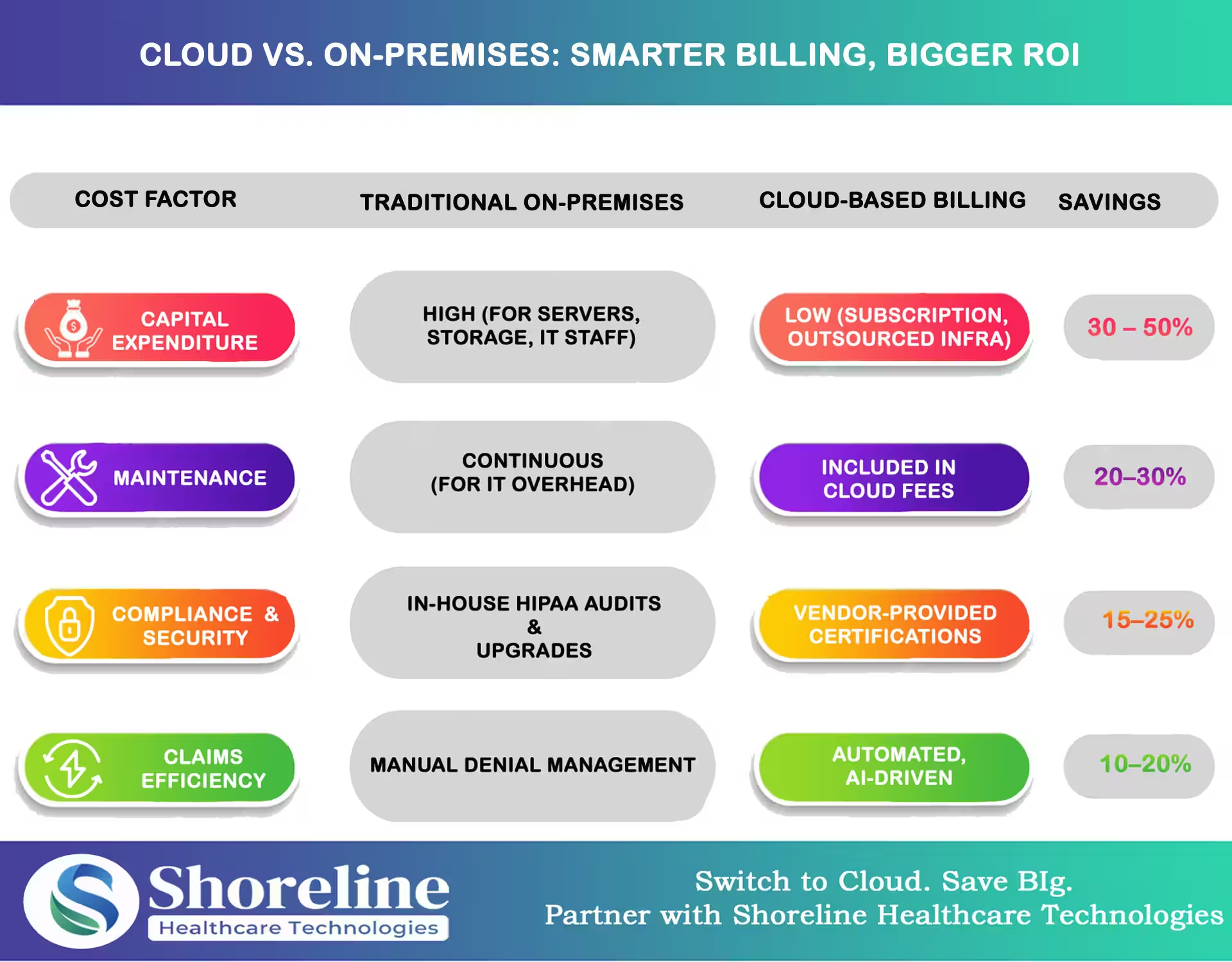Reduces IT Costs and Boosts Efficiency in Healthcare: Cloud Computing
With the rising demand for care, lower reimbursements, higher operational costs and ongoing regulatory challenges the financial pressure on healthcare providers keep building up. And I would suggest that one of the best solutions to keep up with these challenges and move ahead would be cloud computing. By moving key functions like electronic health records (EHRs), revenue cycle management (RCM), telehealth, and data storage to the cloud, healthcare organizations can save big at the same time deliver high-quality care. Through this blog let us see how cloud adoption can reshape the financial outlook for healthcare practices and help them to cut costs, reduce denials, and improve cash flow.
What Exactly is Cloud Computing in Healthcare?
Cloud computing in healthcare means using a secure platform over the internet for storing, maintaining and using various billing related software for analysing the huge volume of healthcare data, instead of buying and maintaining the huge physical servers in a hospital basement.
How does the switch to cloud environment saves money?
The benefits of switching to a cloud environment are significant and impact multiple areas like saving money by eliminating the need for expensive on-premises servers, hardware, and IT maintenance. With scalable subscription model providers can pay for what they use, reducing upfront capital expenses. They also cut downtime, boosting efficiency, and minimizing the costs of software upgradations, compliance, and staffing.

Slash Upfront IT Infrastructure Costs
Traditionally, setting up a hospital's IT system required a massive upfront investment, known as Capital Expenditure (CapEx). This might include:
- ✔ Buying expensive physical servers.
- ✔ Building secure, climate-controlled server rooms.
- ✔ Hiring a large IT team for setup and maintenance.
With the cloud, you reduce IT infrastructure costs dramatically, shifting to operational expenses (OpEx) with pay-as-you-go pricing, potentially saving up to 30% overall.
Pay-As-You-Go IT Model
The biggest advantage of cloud computing is the pay-as-you-go IT model. On-premise servers often struggle to handle peak demand like the end-of-the-month billing cycle or a sudden surge in patient volume. Whereas the cloud is elastic. It can automatically scale up and down as per your needs. You can pay for the exact resources you consume, eliminating waste and ensuring every dollar is put to good use.
Improve Operational and Administrative Efficiency
Cost savings in healthcare aren't just about IT hardware. Cloud-based RCM tools improve claim accuracy, directly boosting provider reimbursements.AI-driven claim scrubbing, automated coding checks, and real-time eligibility verification reduce costly rework and denials.
Lowers the Cost of Security and Compliance
One of the biggest concerns of healthcare data is maintaining security and compliance with federal and state-specific regulations like HIPAA and others. This can be complex and expensive. By moving to a HIPAA-compliant cloud provider, you can leverage the world-class security infrastructure, reducing your risk and the high cost associated with building and maintaining your own compliant systems. This is a key factor in achieving a positive cloud ROI in healthcare.
Shared Resource Model
Cloud platforms operate on a shared infrastructure model, spreading costs across users, making enterprise-grade tools affordable even for small to mid-sized billing operations.
Reduced Downtime & Disaster Recovery
With clouds built-in disaster recovery and redundant backups minimize downtime. This quick data restoration prevents revenue cycle interruptions.
Challenges in switching over to cloud
Data Migration Costs During Transition
Transferring the huge volumes of patient records, billing data, and other information to the cloud is time-consuming. It may include hidden costs like data cleansing, format conversion, and temporary downtime.
We at Shoreline Healthcare Technologies help providers to streamline the migration process with expert planning and automated tools. Our team ensures minimal disruption to your daily operations while maintaining the integrity and security of your data.
Vendor Lock-In
Some cloud providers offer proprietary platforms that make switching vendors difficult. This can limit flexibility and future scalability
Cybersecurity Risks
Healthcare data is highly sensitive and even certified and secured cloud providers face cyber threats like ransomware, phishing, or internal breaches.
Ongoing Subscription Fees
Practices may find recurring cloud subscription costs challenging.
Getting Started: Best Practices for Cloud Adoption
Let me tell you a few simple steps that you can follow to make your transition to cloud environment smooth and cost-effective
Start Small: Don’t try to move everything at once. Initially use it for data storage and automate backups for disaster recovery and make yourself comfortable with the process before going ahead with the entire shift.
Choose the Right Partner: Always select the right cloud provider with a proven track record in managing healthcare data. Check whether they offer a Business Associate Agreement (BAA) and also, they follow HIPAA compliance.
Plan Your Migration: Create a detailed plan for migrating considering the factors like costs and downtime.
Train Your Team: Any best technology becomes effective only if your staff knows how to use it. So, invest in training your team and help them leverage the new cloud-based tools effectively.
Why should you choose Shoreline Healthcare Technologies?
We at Shoreline Healthcare Technologies combine expertise, technology, and hands-on approach, to reduces migration headaches, enables full data portability, mitigating the risks of cyber-attacks, and helps practices maintain cost efficiency. We make your transition journey smooth, secure, and future-ready.
We prioritize cloud portability and select solutions that allow data export and interoperability.
Our multi-layered security model includes end-to-end encryption, role-based access, audit trails, and regular security assessments that protects patient data.
We help practices optimize cloud plans, eliminating unnecessary features and scaling resources to actual usage making costs predictable and aligned with practice size.
By partnering with Shoreline Healthcare Technologies providers can unlock significant benefits like cost savings by moving away from rigid, expensive on-premise systems, enhance their security, and free up resources to focus on delivering outstanding patient care.
FAQs
Q1. Is cloud computing suitable for small healthcare practices?
+Yes, Cloud platforms offer affordable pay-as-you-go models making it ideal for small practices, avoiding the need for huge investments in hardware.
Q2. What is scalability and why does it matter for a hospital?
+Scalability is the ability to easily increase or decrease IT resources as per our needs. It's crucial for handling fluctuations in patient load and data volume without over-provisioning hardware.
Q3. How does pay-as-you-go model reduce costs?
+With pay-as-you-go model you pay only for resources used, avoiding the expenses of new hardware.
Q4. Is ShorelineMB the same as Shoreline Healthcare Technologies?
+Yes, ShorelineMB.com is the official website of Shoreline Healthcare Technologies, a leading provider of medical billing and RCM services.
















Contact Shoreline Healthcare Technologies for a personalized cost-benefit analysis!